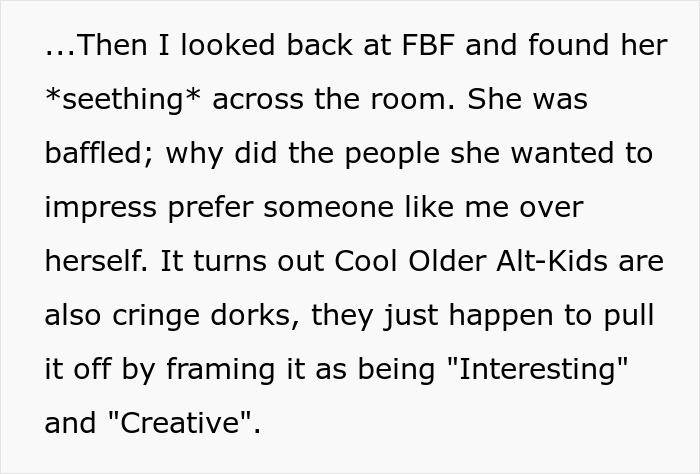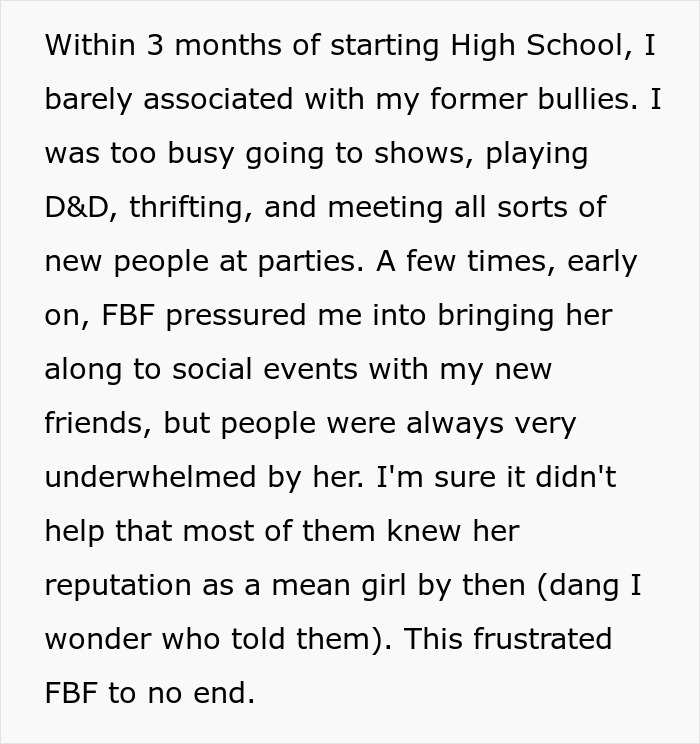Bullying remains a scourge in our society even to this day. Whether it’s physical abuse in the schoolyard, supervisors playing power games in the office, or trolling someone undeserving online, bullies delight in traumatizing their victims in any way they can.
One woman turned to the web to recount how her former bestie had turned on her in middle school, suddenly becoming the number one bully in her unhappy life. The tables would turn once they reached high school, however, as the woman went on to share on Reddit.
More info: Reddit
Bullying can be the worst, but this woman never expected it to come from her longtime bestie

Image credits: jcomp / Freepik (not the actual photo)
In early middle school, her former best friend turned on her, considering their friendship a risk to her social status




Image credits: Freepik / Freepik (not the actual photo)
The woman was tormented by her ex-bestie for years, but things took a turn when she got to high school





Image credits: Freepik / Freepik (not the actual photo)
Thanks to her quirks, the cool, older alt-kids took a liking to her, and she was finally accepted and appreciated for who she was




Image credits: Moist_Policy_71
Her former best friend went on to be a nobody with no redeeming qualities but still tried to imitate her interests in a desperate attempt to fit in
OP begins her story by telling the community that she was a very—in her own words—“dorky” kid, into reading, sci-fi, old movies, and music. She adds that her family was not well-off and, on top of that, she had undiagnosed ADHD with questionable social skills.
She goes on to say that, in early middle school, her longtime best friend decided that being friends with her was social suicide. Not only did the former best friend ditch her, she ended up being OP’s number one bully, teasing and humiliating her, sometimes in front of the whole class.
Well, the bullying went on for years, but it was once they reached high school that the tables started to turn. As luck would have it, some of the cool alt-kids took a liking to OP and quickly adopted her into their clique. This vexed her former best friend, who couldn’t figure out what they saw in her.
OP shares that she soon left her bullies behind, too busy going to shows, playing D&D, thrifting, and meeting all sorts of interesting people at parties to spare them a thought. On a few occasions, her former best friend begged her to tag along to gatherings, but apparently, nobody found her very interesting or likable.
The ex-bestie even started imitating OP, feigning interest in exactly the same things she’d bullied OP for, but she didn’t fool anyone by trying to chase “cool”. OP says it might have had something to do with the fact that she had a mean-girl reputation.
OP concludes her story by telling the readers that, while someone may find your quirks embarrassing, others might value you for exactly what makes you different.
If you’ve been to school, you’ve most likely experienced a bully, either directly or as a bystander. But what makes someone bully? And what’s the best way to deal with one? We went looking for answers.

Image credits: MART PRODUCTION / Pexels (not the actual photo)
In her article for VeryWellMind, Nadra Nittle writes that the motivation behind bullying may change from person to person, but all bullies share a few common characteristics. As an example, some people bully because they know it will get them what they want, while others do it because they are extremely insecure.
According to Nittle, bullying exists on a spectrum. Not every bully resorts to physical abuse or name-calling, as kids are typically known to do. Adult bullies might engage in sophisticated smear campaigns against their victims instead of insulting them directly.
There’s no single reason why people bully. It could come down to issues of insecurity, feeling powerless, a need to control others, or just pure enjoyment and the perceived rewards of bullying. In some cases, it’s learned from growing up in a home where the adults modeled this negative behavior.
According to the BetterHealth website, there are several ways you can put an end to bullying. A few of them include taking a stand, having a support group that can intervene as a collective, staying emotionally neutral, managing the situation quickly before it has time to develop, and not keeping the bullying a secret—even if it’s at work.
Fortunately, OP’s years of abuse came to an end once she found her tribe, but if you’re a victim of bullying, it may be best to speak up to friends, family, or the bully themselves. You never know, it could be a defining moment in both of your lives.
Do you think OP’s bully got what was coming to her? Have your own story about a bully finally getting their comeuppance? Let us know in the comments!
In the comments, a number of parents thanked the poster for her story and many readers shared how happy they were for her that she finally found her niche























